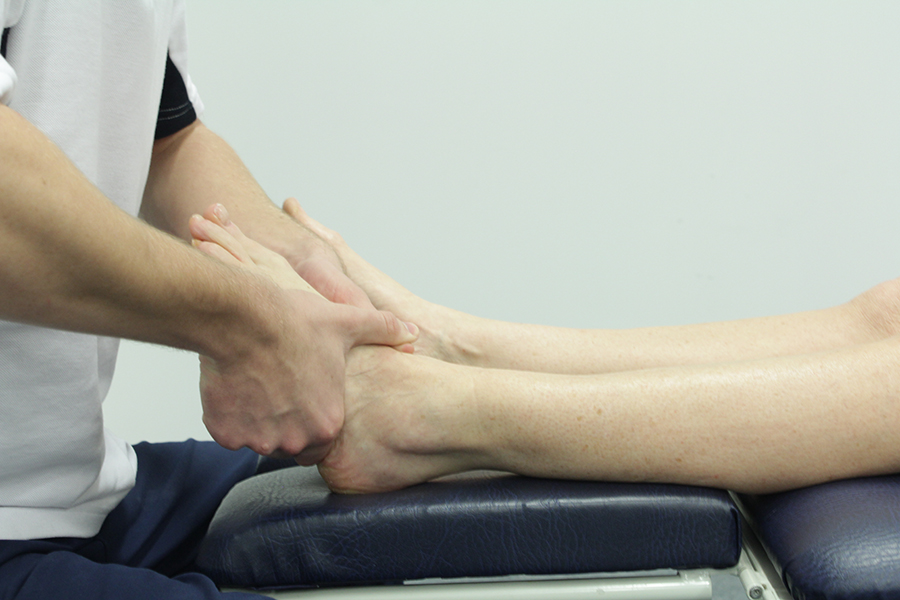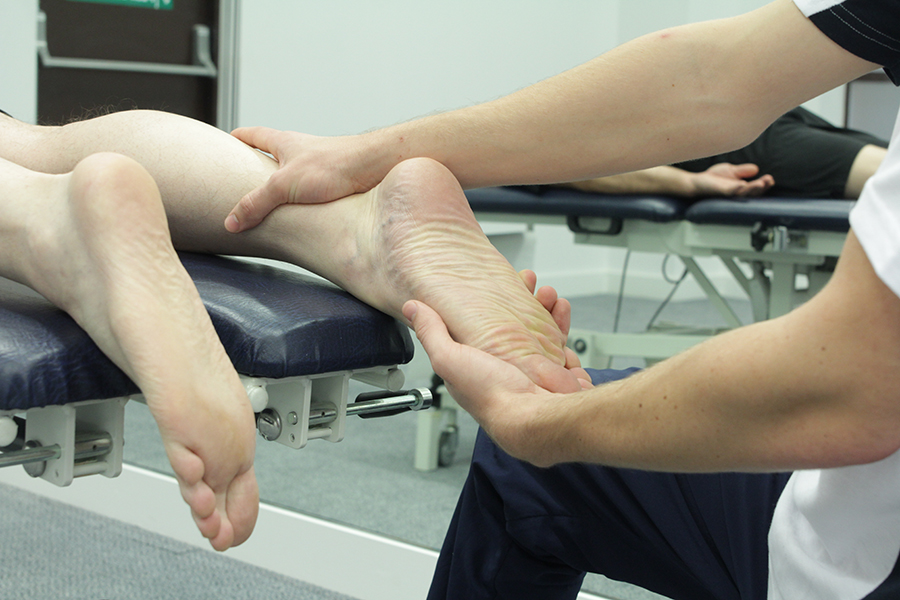Stress fracture of the calcaneus
A stress fracture of the calcaneus is a painful condition of the heel bone that occurs when a small crack appears in the heel bone.
A stress fracture of the calcaneus describes a crack in the calcaneus, which is the medical name for the heel bone. A stress fracture of the calcaneus causes pain and discomfort, particularly when standing.
A stress fracture of the calcaneus may be caused by either repetitive stress (e.g. road running) or sudden trauma (e.g. jumping from a great height). When attributed to overuse and stress this is because the bone is unable to remodel and adapt which the bone does to strengthen itself, so that it can withstand the stresses being placed on it) in time with the stresses being placed upon it.
If sudden trauma is the cause, a stress fracture or 'crack' can appear as a result of the sudden force.
Other factors that may contribute to the development of a calcaneal stress fracture include:
The signs and symptoms of a stress fracture of the calcaneus may include:

There are a number of conditions that can cause heel pain, it is therefore important to visit a podiatrist who will be able to distinguish between these. A diagnosis of a stress fracture of the calcaneus will be made based on the following:
The podiatric benefits that can be gained through assessment and treatment at Chiropody.co.uk include:
It is important to distinguish a stress fracture of the calcaneus from other painful conditions that can affect the heel so that the correct treatment can begin. A diagnosis of a stress fracture to the calcaneus should therefore be based on a thorough history, the signs and symptoms, and an examination of the affected area. The aim of treatment for a stress fracture of the calcaneus is to reduce pain and to redistribute pressure away from the heel. Treatment for a stress fracture to the calcaneus may include:

A stress fracture of the calcaneus describes a crack in the heel bone that has been caused by repetitive stress (e.g. running on a hard surface), or a single traumatic event (e.g. jumping and landing from a great height). Stress fractures of the calcaneus produce pain when weight bearing, there may also be swelling.
If you think you may have a stress fracture of the calcaneus it is important to seek treatment from a professional, as a number of conditions can cause heel pain.
To arrange an assessment with one our podiatrists please email office@chiropody.co.uk or call 0330 088 4222.
What is a stress fracture of the calcaneus?
A stress fracture of the calcaneus describes a crack in the calcaneus, which is the medical name for the heel bone. A stress fracture of the calcaneus causes pain and discomfort, particularly when standing.
What causes a stress fracture of the calcaneus?
A stress fracture of the calcaneus may be caused by either repetitive stress (e.g. road running) or sudden trauma (e.g. jumping from a great height). When attributed to overuse and stress this is because the bone is unable to remodel and adapt which the bone does to strengthen itself, so that it can withstand the stresses being placed on it) in time with the stresses being placed upon it.
If sudden trauma is the cause, a stress fracture or 'crack' can appear as a result of the sudden force.
Other factors that may contribute to the development of a calcaneal stress fracture include:
- Poor biomechanics
- Inadequate cushioning/shock absorption at the heel
What are the signs and symptoms of a stress fracture of the calcaneus?
The signs and symptoms of a stress fracture of the calcaneus may include:
- Pain at the heel that occurs gradually and is worse when standing
- Pain is felt when the back of the heel is squeezed
- Swelling

How is a stress fracture of the calcaneus diagnosed?
There are a number of conditions that can cause heel pain, it is therefore important to visit a podiatrist who will be able to distinguish between these. A diagnosis of a stress fracture of the calcaneus will be made based on the following:
- Medical history
- History of the problem
- Signs and symptoms
- The result of tests
Benefits of podiatry for a stress fracture of the calcaneus
The podiatric benefits that can be gained through assessment and treatment at Chiropody.co.uk include:
- Reduced pain
- Reduced inflammation
- Improvement in shock absorption
- Improvement in foot and lower limb function
- Improvement in gait
- Quicker healing time
- Reduced risk of future injury
What would podiatry for a stress fracture of the calcaneus involve?
It is important to distinguish a stress fracture of the calcaneus from other painful conditions that can affect the heel so that the correct treatment can begin. A diagnosis of a stress fracture to the calcaneus should therefore be based on a thorough history, the signs and symptoms, and an examination of the affected area. The aim of treatment for a stress fracture of the calcaneus is to reduce pain and to redistribute pressure away from the heel. Treatment for a stress fracture to the calcaneus may include:
- Rest
- Anti-inflammatory advice
- Footwear review
- Orthoses
- Cushioning
- Lipus
- Advice and education

Summary
A stress fracture of the calcaneus describes a crack in the heel bone that has been caused by repetitive stress (e.g. running on a hard surface), or a single traumatic event (e.g. jumping and landing from a great height). Stress fractures of the calcaneus produce pain when weight bearing, there may also be swelling.
If you think you may have a stress fracture of the calcaneus it is important to seek treatment from a professional, as a number of conditions can cause heel pain.
To arrange an assessment with one our podiatrists please email office@chiropody.co.uk or call 0330 088 4222.
Save 5% by booking an appointment online.

Find your nearest clinic
We have clinics located throughout the North West. We also provide a home visit service.
Find out more »

No waiting lists!
Tired of waiting for treatment? Be seen by a podiatrist today!
Find out more »

Not sure how we can help?
Speak to a podiatrist to find out how we can help. Call us on 0330 088 4222.
Find out more »
We work with:

Individuals

Organisations

Health professionals
Get in Touch!
0330 088 4222
If you would like to speak to one of our specialists then please complete this form.
We are open 7 days a week








